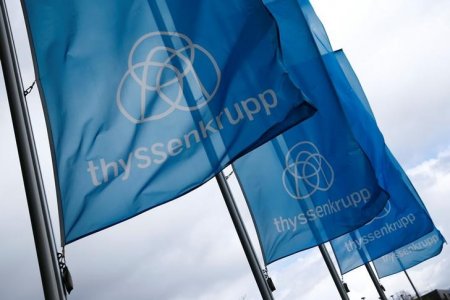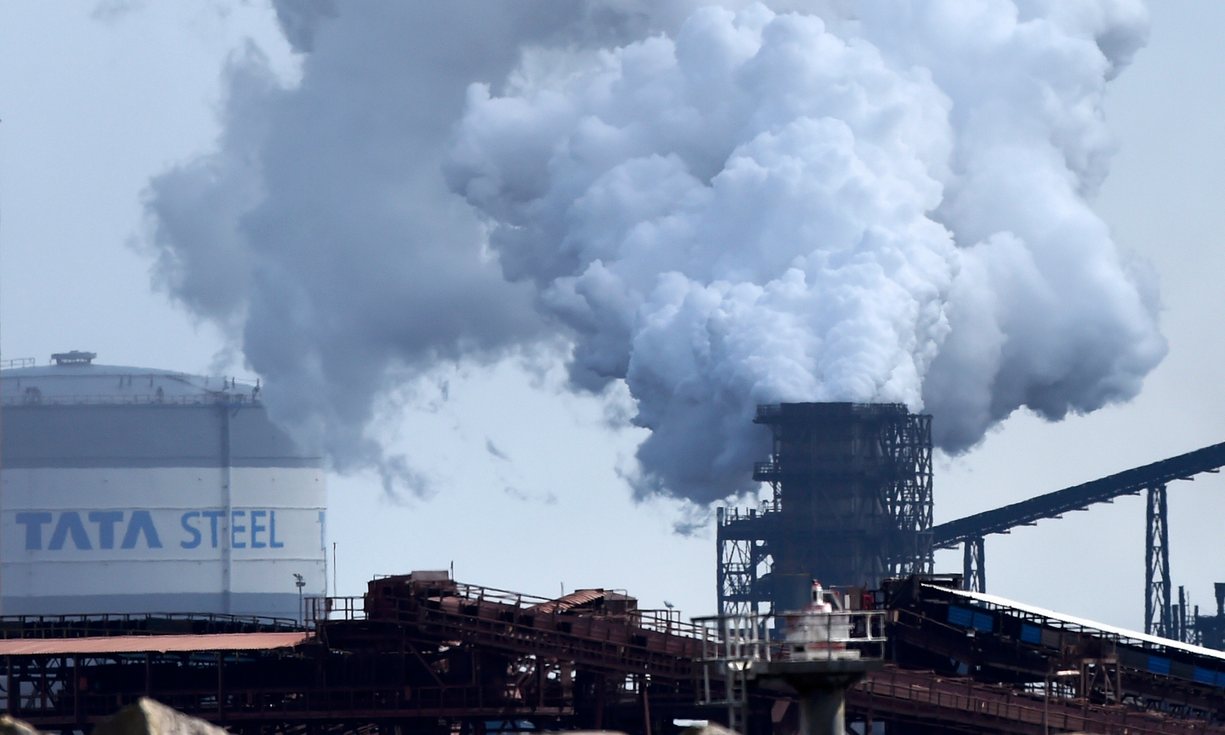
Flags with the new logo of German steel maker ThyssenKrupp flutter in the wind in Essen
Thyssenkrupp , Germany's biggest steelmaker, confirmed on Sunday that it is in talks with India's Tata Steel about a consolidation of beleaguered European steel mills that are hit by overcapacity, weak demand and cheap imports.
Tata Steel said on Friday it had suspended the process of selling its troubled UK arm while it held talks with potential partners, including Thyssenkrupp, about alternative and more sustainable solutions for its entire European business. In addition to its UK operations Tata Steel Europe also owns the former Hoogovens steel plant in the Netherlands.
Thyssen spokeswoman Nicola Roettger, contacted by Reuters, said on Sunday her company has long said it believes that a consolidation of the European steel industry is necessary, due to the extremely difficult economic situation.
"We have also said already that in such a situation, everybody's talking to everybody else. Among other (conversations), we are also talking to Tata Steel," she said.
She said it was to be left open for now if, when, and with whom further steps would be taken. More specific statements would be made only if decisive progress towards consolidation could be made.
Tata had said in a statement on Friday that the talks, which could include a possible joint venture, were at a preliminary stage and the European approach was in addition to its attempts, launched in March, to sell its main British steelmaking operations, which include its Port Talbot blast furnace plant in southern Wales.
The firm said the British vote to leave the European Union, and the outcome of the UK government's consultation on Tata Steel UK's British Steel pension scheme, had prompted a rethink on the sale.
"Consequently, Tata Steel has now entered into discussions with strategic players in the steel industry, including Thyssenkrupp," the Indian company said.
However, Thyssenkrupp has said in the past it is not in a position to spend cash on a merger.
(Reporting by Matthias Inverardi and Ralf Banser, writing by Vera Eckert; Editing by Greg Mahlich)
Related news:
Tata stops Port Talbot plant sale as talks begin with German steel group

Tata Steel has halted plans to sell the Port Talbot steelworks and is instead working on keeping its UK business as part of a joint venture with the German conglomerate ThyssenKrupp.
The announcement will be met with a mixed reaction by Tata Steel UK’s 11,000 workers. While the Port Talbot steelworks in south Wales is now closer to securing its survival, Tata warned that the deal could still fall apart.
The company said on Friday night that it was in talks with ThyssenKrupp about combining its European steel businesses, including in the UK, but the deal requires financial support from the British government and a restructuring of Tata Steel’s pension scheme. It also confirmed it would look to sell its speciality steels business, which is based in Yorkshire, and its pipe mills in Hartlepool. These sites employ around 2,000 people. The speciality steels division faces a Serious Fraud Office investigation and some of its top staff are suspended, which could complicate a sale.
Tata Steel announced in March that it was considering pulling out of its UK business, sparking heavy criticism of the government for not dealing with the crisis in the steel industry. The company began a sales process for the business, and seven potential bidders were shortlisted. However, it decided to work on a deal to keep its UK concern after the government pledged to offer hundreds of millions of pounds of support and restructure the company’s pension scheme.
A source close to Tata Steel said the company was keen to keep the UK business but was waiting for the government to deliver on its pledge to provide support. The source said that it was time for “put up or shut up” from the government. Koushik Chatterjee, Tata Steel’s executive director for Europe, said: “It is too early to give any assurances about the success of these talks.
“Such success, especially the inclusion of the UK business in the potential joint venture, would depend on several issues, including finding a suitable outcome for the British Steel pension scheme, successful discussions with the UK trade unions and the delivery of policy initiatives and other support from the governments of the UK and Wales.”
Chatterjee said that creating a joint venture with another steel business would create “a premium, world-class strip-steel business with the scale and scope of capabilities to compete successfully on the global stage”. He said the company had considered the bids it received for the UK business but wanted to look at “alternative and more sustainable portfolio solutions for the European business”. As a result it was talking to other steel companies, including ThyssenKrupp, although these were at a “preliminary stage”.
ThyssenKrupp has a longstanding interest in merging its steel business with Tata. The companies held talks about a deal earlier this year but they broke down because the German company was concerned about the losses of the UK business and its pension liabilities. Since then, the government has offered loans of up to £1bn to support Tata Steel and revealed plans to restructure the pension scheme.
The sharp fall in the price of sterling since the EU referendum has also helped Tata Steel UK. The slump in sterling has made Tata Steel UK’s exports more attractive to buyers in Europe and elsewhere, and made it more expensive for China to export steel to Britain.
However, the result of the referendum has also caused turmoil in the government, leading to concerns within Tata about whether it can win approval for state aid and the pension scheme restructuring, which needs to be enshrined in law. The latest figures show the pension scheme has a deficit of £700m and liabilities of almost £15bn.
The government has drawn up a plan with trustees and trade unions that would see the scheme spun off into a new shell company and the inflation-linked annual increase benchmarked against the consumer price index rather than the retail price index, potentially saving billions of pounds in future liabilities.
However, the Pension Protection Fund and some MPs have said this could create a dangerous precedent and encourage other companies to walk away from their pension liabilities. A consultation on the changes finished last month, but the government is yet to make a further announcement.
